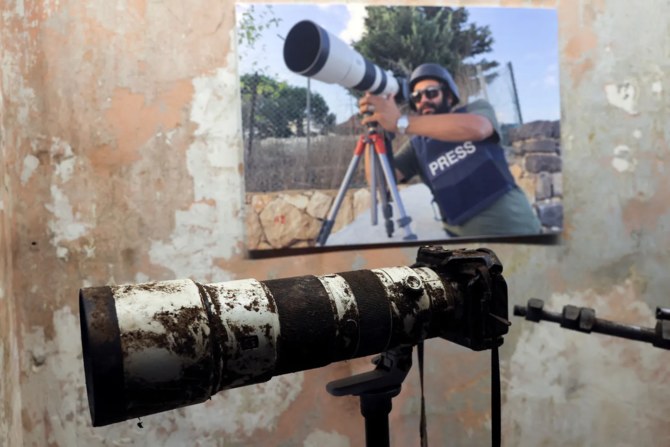LONDON: Investigations by Human Rights Watch, Amnesty International, Reuters, and Agence France-Presse have found that an Israeli attack on Oct. 13 was likely to have been a deliberate assault by the Israel Defense Forces on civilians, which is a war crime.
The attack killed journalist Issam Abdallah, from Reuters, and injured six others including Carmen Joukhadar and Elie Brakhya from Al Jazeera; Dylan Collins and Christina Assi from AFP; and Thaer al-Sudani and Maher Nazeh from Reuters.
The reports include witness testimony and are based on analysis of videos, audio, munition remnants, and satellite imagery verified by the organizations, as well as multiple interviews with officials and civilians.
Aya Majzoub, Amnesty International’s deputy regional director for the Middle East and North Africa, said: “Our investigation into the incident uncovers chilling evidence pointing to an attack on a group of international journalists who were carrying out their work by reporting on hostilities.
“Direct attacks on civilians and indiscriminate attacks are absolutely prohibited by international humanitarian law and can amount to war crimes.”
The findings are in line with the Committee to Protect Journalists’ report “Deadly Pattern,” published in May, which showed lethal force by the Israel Defense Forces had left 20 journalists dead over the last 22 years, without any accountability.
The CPJ said it welcomed the four reports and “reiterates its call for an immediate, independent, and transparent investigation that holds the perpetrators to account.”
Ramzi Kaiss, Lebanon researcher at Human Rights Watch, said: “This is not the first time that Israeli forces have apparently deliberately attacked journalists, with deadly and devastating results.”
The attack on Oct. 13 occurred at around 6 p.m. The group of journalists had gathered as early as 4:45 p.m. in a clearing on a hilltop in Alma Al-Shaab, to film ongoing fighting on Lebanon’s southern border with Israel.
Journalists from Al Jazeera had conducted two live TV reports, the first at 4:55 p.m. and the second at 5:24 p.m., from the same location.
Live transmissions by Reuters and AFP were also broadcast on air by several television stations during that period.
The journalists had remained stationary for over 75 minutes before they were hit, and none of the evidence indicated the presence of any military target near the journalists.
All seven journalists were wearing helmets and blue ballistic vests with labels that said “PRESS,” and were clearly identifiable as journalists.
Footage also shows the group wearing the clearly marked vests and helmets in the same area, near a car marked with “TV” in large letters on its hood.
Five cameras belonging to journalists indirectly captured the attack and its aftermath, shedding light on how the attack was carried out and from where.
Evidence reviewed by the organizations indicates that the Israeli military knew or should have known that the people they were firing on were civilians.
The journalists interviewed said that the first attack struck Abdallah, killing him instantly, and badly injuring photojournalist Assi.
Just 37 seconds later, the car owned by Al Jazeera was engulfed in flames and destroyed by a second attack, resulting in more injuries to journalists.
Majzoub said: “Under international humanitarian law, parties to a conflict have a clear obligation to protect civilians, including journalists, and must at all times distinguish between civilians and civilian objects on one hand and fighters and military objectives on the other.”
HRW asserted that “warring parties are obligated to take all feasible precautions to avoid harm to civilians” and must “verify that targets are military objectives.”
It also suggested that Israel’s key allies, Germany, Canada, the US and the UK, “should suspend military assistance and arms sales to Israel, given the real risk that they will be used to commit grave abuses.”
Kaiss said: “The evidence strongly suggests that Israeli forces knew or should have known that the group that they were attacking were journalists.
“This was an unlawful and apparently deliberate attack on a very visible group of journalists.”
















